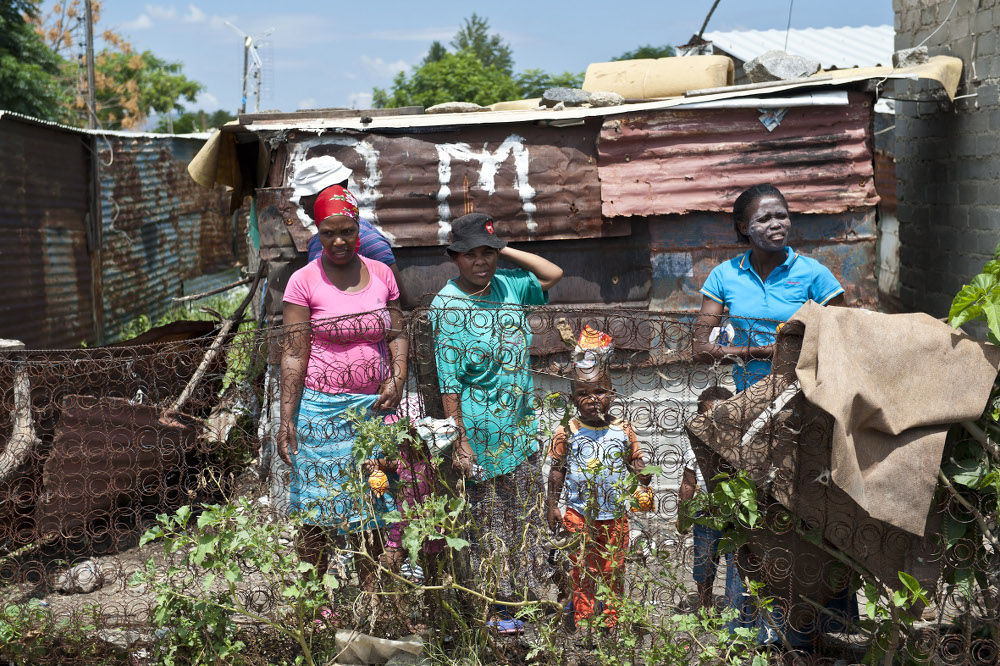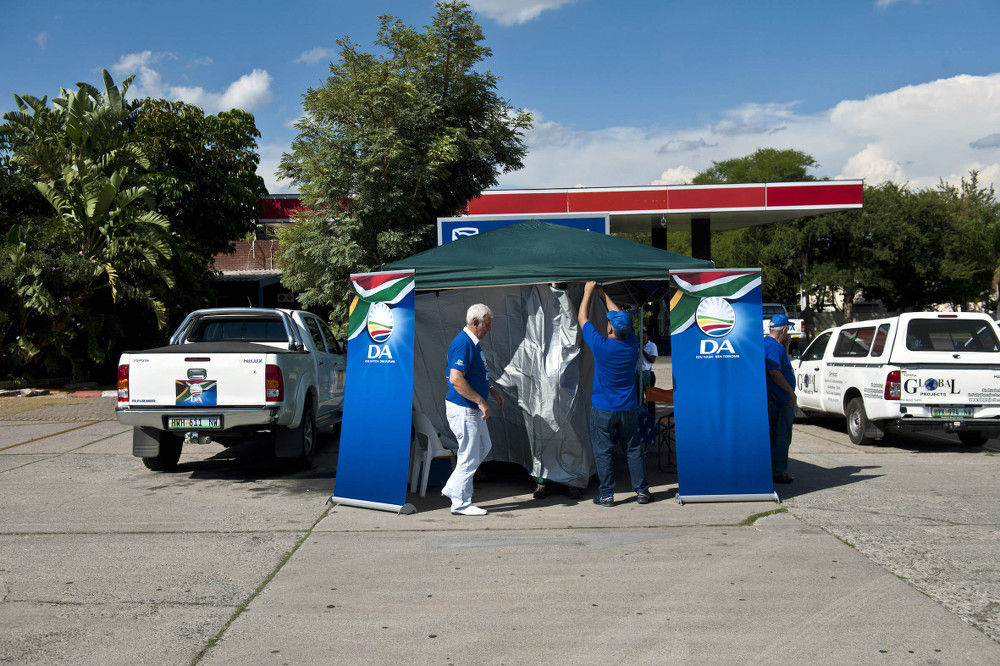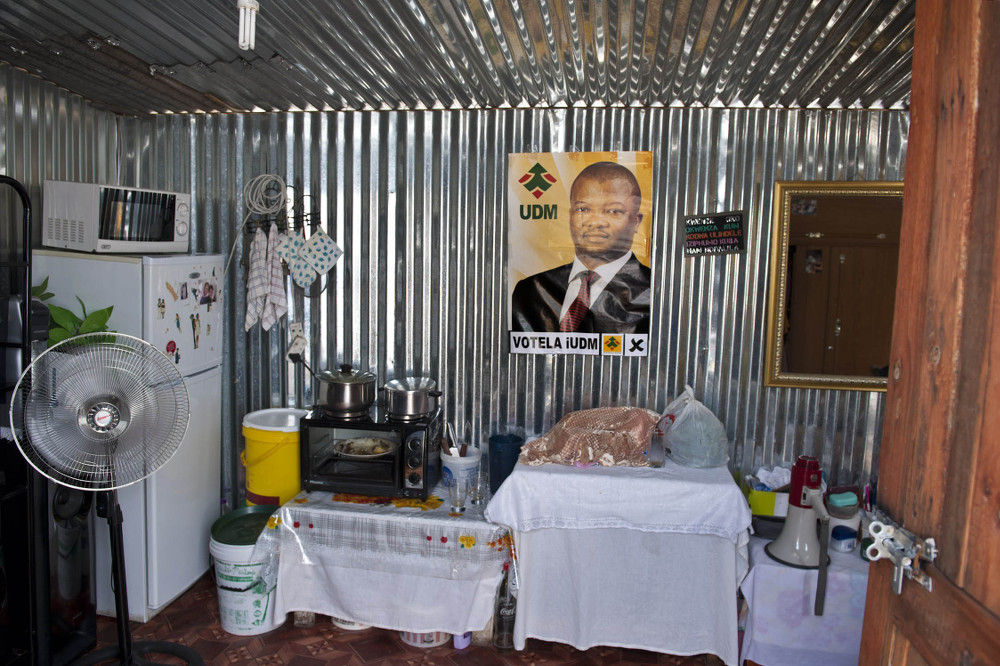ANALYSIS
Three women make their way past Wonderkop – the infamous koppie where police shot and killed 34 striking mineworkers on August 16 2012 – and on to Marikana's main street. It's the end of their working day; they chat excitedly over where their mark might land on the ballot paper in the May 7 general election.
"I'm not sure who to vote for," says Anna Malope. "There is no service delivery. We are not satisfied with [President Jacob] Zuma."
"Bantu Holomisa [the United Democratic Movement (UDM) leader]? He was in the struggle," says Emma Mdletshe. "Malema, he has too much of, er, emotional conflict." Ncobo interjects: "He was born yesterday, now he thinks he can rule the country."
Mdletshe, like her friends, has registered to vote, but is uncertain whether she will when the time comes. "Or maybe I can vote for Mamphela [Ramphele, the Agang SA leader]," she says. Her friends burst into laughter.
Election campaigning is in full swing in the troubled platinum district. Although the ANC remain confident of a strong showing, opposition parties see an opportunity to win over a great number of disgruntled voters.
'Opportunistic' parties stick to Amcu
The Rustenburg council consists of 38 wards, of which the ANC has 30.
The Democratic Alliance (DA) holds five wards in the town council area and the remaining three were won by independent councillors.
Amos Mataboge, the ANC's election team co-ordinator for the Rustenburg area, says there has been no massive surge of any political party despite "opportunistic political parties" that had tried to align themselves with the Association of Mineworkers and Construction Union (Amcu) after the Marikana massacre.
But the emergence of Amcu has not necessarily translated into a different political allegiance, Mataboge says. "These people, we live and stay with [them] in our areas and they also form part of the communities we live within."
Mataboge says those belonging to Amcu had approached him before for ANC T-shirts. "They are in Amcu, but not in any political sense."
It's not about rallies anymore
Campaigning for the ANC started four months ago. "Our strategy is very simple: voter contact by engaging door to door, house to house. Our focus is no longer on holding massive rallies," says Mataboge.
On the western limb of the world's richest platinum deposits, appalling living conditions persist and, as was the case in 2012, rubbish remains strewn around the area where stray dogs, goats and pigs forage.

(Delwyn Verasamy, M&G)
The auditor general's report on the audit outcomes of municipalities in the North West for the year 2011- 2012 show a poor outcome, with 81% of the audits receiving qualified or adverse opinion reports, or disclaimed with findings.
Over the past three years there has been no progress towards clean audits, with no auditees obtaining clean audits.
The Rustenburg municipality has had the most unauthorised expenditure – as much as R449.8-million. The municipality of Madibeng, under which Wonderkop falls, has also received a disclaimer for the past four audits, before which the audit outcome was adverse. The municipality now faces being placed under administration by the provincial government.
Discontent 'not just at the mines'
The unrest on the platinum belt is "of course an opportunity for us", says councillor Gys Smit, election campaign manager for the DA in Rustenburg. "The ANC makes it easy for us by showing what they are not doing … There is a general sense of discontent overall – not just at the mines."
The main concerns for communities are housing and water, he says.
The DA, which has won wards in Rustenburg's town council area, is also embarking on a door-to-door campaign in settlements. The party also aims to campaign at shopping malls and busy areas.
And a great deal of energy goes into combating negative perceptions of the party. "There is a strange and sad misconception that the DA will take away social grants and bring back apartheid," Smit says.
"I wouldn't say we are targeting people at the mines. The Economic Freedom Fighters [EFF] have that locked up."
Ground 'fertile' for EFF's election win
Solly Pule Setlale, the EFF's communications manager in the North West, says the party has made inroads into almost every ward in the province and, in the first eight months of its existence, has recruited 100 000 members in the area.
"The ground in the North West is very fertile for the EFF to win elections," Setlale says. "The ANC here is very weak … The Rustenburg municipality is unwilling to combat corruption and the provincial government is unwilling to step in as and when these things happen."
The EFF, he says, has gone to mining compounds and stood at the entrances of hostels signing up countless members on the spot. "The general feeling from the miners is that they have been betrayed by the ANC-led government," Setlale says.
The election campaign strategy includes an EFF presence at every possible funeral, party and wedding, to engage with communities.
Japhta Molusi, convenor of the EFF branch in Marikana, says supporters take part in "Red Friday" gatherings every week, clad in full EFF regalia – berets and all.
"The living conditions here are deplorable," he says. "People are gatvol with ANC … you never see people wearing ANC shirts here – you will see EFF and maybe United Democratic Movement."

(Delwyn Verasamy, M&G)
'He speaks the truth'
Nelson Sakabe, the UDM's co-ordinator in Wonderkop, sought to start a party structure in the area in early 2012. It was up and running around the same time as the Marikana massacre took place. At first, Sakabe says, it was hard to recruit members, but "it's no problem now. More people are joining."
After Marikana, Holomisa visited the area and asked people to vote UDM and won them over because "he speaks the truth".
The main gripe on the platinum belt, and especially in Wonderkop, is that the ANC promised so many things – water and roads and other basic services – that didn't materialise. Asked whether the mining company in the area should not be blamed too, Sakabe says: "We did not vote for Lonmin; we voted ANC."
Sakabe says the UDM believes it can win over the voters in the area, especially in Wonderkop. Asked if it has a relationship with Amcu, Sakabe, a member of the Solidarity union, says: "No, not yet."
The EFF has also denied any political affiliation with Amcu, but Molusi says the party certainly supports the battle for a higher basic wage.
But the question in the communities around the mines is not really who you might vote for, but rather whether you will vote at all.
'After elections they forget about us'
Smit says there is a strong feeling among voters who are disgruntled with the ruling party, but who are not willing to vote for another party either. "It's like religion. Some people don't go to church because they don't like the pastor, but they are still quite religious."
Daniel, a Rustenburg resident who works as a parking attendant in town, says he will not vote come election time. "I've already realised it is a waste. Even if I vote [for an alternative], the ruling party will win … Before elections they come with food parcels, but after elections they forget about us."

(Delwyn Verasamy, M&G)
Thanks, an Amcu member and Anglo Platinum employee, says he is not prepared to "vote for nothing. That lady in the Cape [DA leader Helen Zille] is maybe better. She has pushed from her side. EFF is also not so bad."
Sphiwe Ngubegusha, a young man who completed matric but now spends his days unemployed and living in Marikana, says he will not be voting this year. "I'm tired of queuing for nothing. We gave the ANC a lot of time, but the rich get richer. I finished school but there is no job for me."
Next to him, Katlego Modikoe says he will probably vote for the EFF. "Even if they eat, it is better than just the ANC eating all the time."
Voter registration
Voter registration numbers have also not been impressive, according to Mataboge.
"The majority of them [migrants] are not registered in Rustenburg – they go home and vote there. In observing registration trends and considering migrant labour around the mines, there is a marginal increase in registration, of approximately one to two percent in some wards – others remain almost the same," he says.
The EFF has raised concerns about registration being cut short on February 9 in some mining communities, despite persistent queues.
The Independent Electoral Commission had not responded to requests for comment by the time of going to press.
Lisa Steyn is a business reporter at the Mail & Guardian